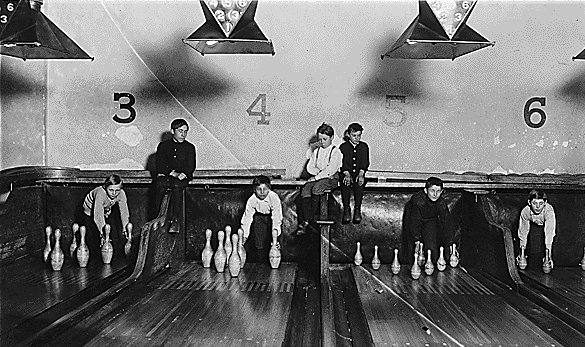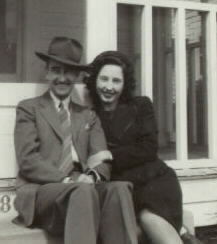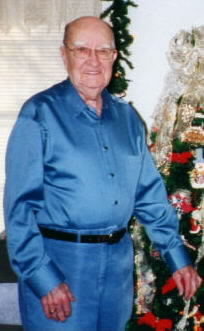Mr. Keys married Edith Sherwin on May 17, 1942, and they have been married for 60 years. He
had many occupations, including a broadcast engineer, aircraft communications equipment
specialist, and radar repairman. He also served in the Army Signal Corp for three years
during World War II. Mr. and Mrs. Keys continued the tradition of moving, living in San
Antonio, Texas; Santa Fe, New Mexico; Shreveport, Louisiana; Houston, Texas; and Tulsa,
Oklahoma. In March 1966, they moved back to San Antonio where Mr. Keys worked as a physical
science technician at Kelly AFB until he retired in November 1981. The Keys remained in San
Antonio and have lived there for 32 years.
I chose to interview Mr. Keys on a job he had as a teenager. He worked at a bowling alley
as a pinsetter, which is now an obsolete occupation. I chose Mr. Keys not only because he
is my grandfather, but also because he is one of the most interesting people I know. This
86 year old man has a memory like no other. Papa, as my family calls him, is a wonderful
narrator and enjoys sharing his life with others. I think his experience as a pinsetter is
an interesting story.
TRANSCRIPTION
When you were growing up, was it typical for teenagers to work while attending school?
Not unless the families were very poor. It wasn't necessary that I worked as a child until
the Great Depression. Dad always had a good job, and I assume they just
wanted me to have a normal life. Most of the time, when I wasn't studying, I was out playing
around with the kids in the neighborhood.
How old were you when you got your first job?
When I was in school, about the 7th or 8th grade, I sold magazines door to door… That was my
first job kind of on my own… When I was in high school, my aunt and uncle owned a little café,
and in the front of it on the street was an ice dock where people drove by in their cars, and
we'd sell them blocks of ice…
Did you have a job as a teenager that is now obsolete?
The one I can remember is the one I had in a bowling alley as a pinsetter. This job didn't pay
very much, but it was still a job. The bowling alley was located downtown right in the business
district and usually operated mostly at night because in those days people didn't have much time
to do any recreation during the day or during the afternoon, so they opened the bowling alley up
at night.
Can you describe what you did at work?
This was a pretty hard job. The way it worked, the pin boys sat at the end of the alley where the balls came down and hit
the pins. We had a rack up above us which we pulled down by hand, and we pulled this rack down
and put the pins in and then raised the rack back up. Then we sat up on a little seat in the
side of the little booth there to keep the pins from hitting our legs. So here comes the ball
real fast, and it hits the pins, and they fly everywhere. Now if they didn't get a strike,
there were some pins left, so they'd send the ball down the alley again to try to get a spare.
Anyway, what we'd do, we'd pick up the pins and put them aside, and then we'd take the ball
and put it in a little trough thing and let it roll back down to the front to the bowler. See
this wasn't automatic, we had to do all of it. So then we'd pull this rack down, set the pins
in the hole, and then we'd pull the rack back up and set up for another pass at the pins. And
you had to be very careful. Those pins would hit your legs and they're hard, you know, and it
really hurt. So you're just doing that all the time, just as fast as you can because the
bowlers were impatient... That was my first real job I suppose. Back in those days…
(Mr. Keys starts talking about the Great Depression).

What did you like or dislike about the job?
Well, besides making a little money, I didn't like anything about it. It was hard work, and
I was slight of build. And it really was hard. I did it just to pick up a little money, but
I finally decided it was just too much. I was afraid I was gonna get hurt.
So it was it dangerous?
Yeah, it was dangerous. It was dangerous because of those pins. I don't remember anyone
ever having been seriously hurt, but I'm sure that somebody must have had some bad bruises on
their legs. The pins in those days, I don't know what they're made of now, but they were
made out of hard wood. And they're pretty heavy. And when the ball hits the pins, they just scatter
everywhere. There was always a chance that one would hit you, you know a vital spot on your
body, and really hurt you.
Did one ever hit you?
I don't remember ever having been hit. I've been pretty close. But I don't think, I don't
remember ever having been hit. But I was always afraid I was going to be.
I know you said you didn't get paid very much, but for it being during the Great Depression,
do you think it was a decent wage?
Well, for just a kid working at what would be a minimum wage job now, I guess it was adequate.
Nobody was overpaid in those days except the people that had really good jobs. It was just a
little money, but a little money went a long ways. I don't remember exactly how much I was
paid. It wasn't very much because the bowling fee wasn't much. You know, everything was
cheap in those days, it's inflation, well what you had was deflation because of the Depression.
I suppose it was a normal salary or pay for whatever I was doing, which was just a manual
job.
Did they pay you by the hour?
No, they paid you by the, I don't know what they call it, a bowling game or frame. We were
paid about ten cents a frame or something like that, which wasn't very much, depending on how
many people used your alley. You know, in those days bowling wasn't all that popular like it
is today. You didn't have people just standing in line to get in to bowl. Most people were
not so concerned about the recreation as they were about how to make a living. If you worked
all day, you were tired, and you didn't feel like coming down and bowling. So we were just
paid by the frame or the game.
What did your parents think about your job? And what did you think about your job?
They thought it was all right as long as I didn't get hurt. They thought it was fine if I
wanted to do it. That beat just doing nothing, loafing around. I thought it was fine to work.
If I could have, I would have had a much higher paying job. But just out of high school
with only a high school education, I had no real training for anything. It was good as
long as it lasted.
Why do you think there are no longer manual pinsetters?
Well, it slows the game for one thing, and it raises the cost of the operation of the bowling
alley. Because once the bowling alley buys the
automatic pinsetters,
they have them for the life of the business and they can take depreciation off of them and so
forth. It saves them a lot of labor costs. If you had
manual pinsetters,
you'd have to pay them minimum wage, which is about $5.50 now, and that adds up if you have
say ten or fifteen alleys, ten or fifteen people. Besides that, you can't just work forever.
You have to take breaks, and you can't work just straight through for eight, ten, or twelve
hours.
So do you think the job is better now that a machine runs it?
Oh yeah, it's a lot better. It's faster, it's more economical, it's more precise.
Your ball is automatically returned to you. Your pins are automatically set. And as soon as
the ball hits the pins, they scatter. If you get a strike, the pins are set immediately and
your ball comes out immediately, so you can bowl really fast. And of course, the faster people
bowl, the more people the bowling alley can accommodate in any one time period.

ANALYSIS
Although the pay was ample during the Great Depression, my grandfather did not seem to enjoy
his time as a manual pinsetter. This is mainly because it was a dangerous job. Sitting up
in the seat at the end of the alley, he constantly worried about being hit by one of the heavy
pins. He was never hurt on the job, but he left the bowling alley after a short time
due to his fear of the pins.
I learned a lot about pinsetters from my grandfather. Being a child of technology, I never
thought about this job being done manually. Bowling for me has always included a machine setting
the pins and returning the ball. Therefore, it was difficult for me to picture a person sitting
up there doing this. However, since my grandfather is such a great narrator, he quickly painted
a picture that made it easy for me to envision manual pinsetters. I learned that pinsetters not
only had a dangerous job, but also a repetitive one. I'm sure this made the job quite boring.
In addition, pinsetters had to deal with impatient bowlers who wanted to move on with their
game. In my opinion, this does not seem like the greatest job. I have to agree with my
grandfather that automatic pinsetters are better. They seem to solve all the problems of
manual pinsetters, including speed and accuracy. They are also more cost-effective.
ANNOTATED BIBLIOGRAPHY
Paris, Texas: This site provides
historical background about Paris, Texas. It was created by Lone Star Internet, which is
endorsed by the Texas Hotel and Motel Association and The Recreational Vehicle Association.
Great Depression: This site provides a timeline of the Great Depression.
It was created by historian Ross Nordeen. Copyright 2002.
Automatic pinsetters: This site
provides information and photographs of automatic pinsetters. It was created by the
International Candlepin Bowling Association. Copyright 2000.
Manual pinsetters:
This is an article about manual pinsetters in the "Antarctic Sun." It was written by Jeff
Inglis on January 30, 2000.
Return to Oral History Projects

